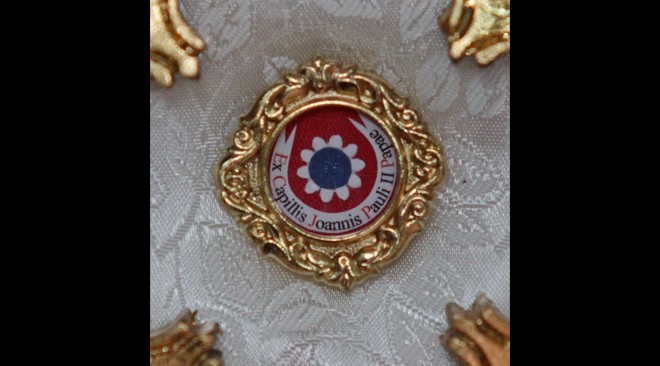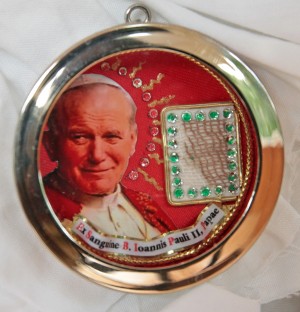Cebu has hair of John Paul II and piece of John XXIII’s skin

RELIC of Pope John Paul II’s hair seen at Tabor Hills Chapel of Relics at Barangay San Jose Talamban. CDN PHOTO/JUNJIE MENDOZA
CEBU CITY—Cebuanos need not travel to Rome to pay homage to two of the most influential popes of the 20th century.
In a hilly portion of Talamban in Cebu City, a hair strand and blood stain from late Pope John Paul II have been exposed for public veneration. Also on exhibit at the Chapel of Holy Relics in Tabor Hills is a part of the skin of Pope John XXIII, whose body is said to have been remarkably preserved following his death in 1963.
Fr. Dennis Duene Ruiz, the chapel’s chaplain and curator, acquired the relics of the two soon-to-be-saints from his acquaintances in Rome, Italy, where he served as assistant in the Office of the Holy Relics for five years.
The two popes are to be canonized on Sunday.
But venerating the relics of holy people isn’t enough.
Ruiz said the people must emulate the lives of those whom they revere.
“If people come to this chapel, we will tell them about the lives of these saints. They should not visit this place just to kiss these relics. For what? If people come here and venerate these relics without imitating the lives of the saints, what a waste it would be,” he said.

ANOTHER relic of Pope John Paul II seen at Tabor Hills Chapel of Relics at Barangay San Jose Talamban.CDN PHOTO/JUNJIE MENDOZA
Aside from the relics of the two popes, Ruiz was also entrusted with a chasuble—the outermost vestment worn by a priest during Mass—worn by Pope John XXIII in celebration of the Eucharist as well as a hard hat used by Pope John Paul II during a visit to an Italian factory.
A stone marker at the Tabor Hills chapel which was blessed by Pope John Paul II in 1997 as well as a life-sized image of the late pontiff are also on display at the Chapel of Holy Relics.
The image of John Paul II, which stands on a table, has him wearing a red chasuble, red leather shoes, a white miter or liturgical headdress, and holding a rosary with hands clapsed.
The Chapel of Holy Relics is under the supervision of the Order of the Discalced Augustinians and houses over 900 relics of different saints, 98 percent of which are so-called “first-class relics.”
The relics are administered by Ruiz with the help of his order in their Tabor Hills compound.
Relics are physical remains of saints such as bones, pieces of clothing or some object associated with saints or other religious figures that have been authenticated by the Catholic Church.
They are divided into three classes. First class relics are body parts of saints; second class consist of their garments; third class are objects touched touched by a first-class or second-class relic, including tombs or burial ground.
Ruiz said relics are not for worshipping but simply for veneration or showing due respect for holy people.
He said he once met Pope John Paul II in 2005, days before the Holy Father died.
“Actually, his hands were shaking uncontrollably from Parkinson’s disease. Also, he could hardly speak already when I met him. I told him, ‘Your Holiness, I’m one of the fruits of World Youth Day.” And he said, ”Bene, bene” (Good, good)’,” recalled the priest, who, along with over 150 other people, had a private audience that day with the John Paul II in Rome.
“Pope John Paul II showed us what the gospel of joy is all about. He was able to show us how to be joyful amid the pains and sufferings he went through when he was still alive,” he said.
Pope John Paul II left an indelible mark in the hearts and minds of Filipinos, especially in Cebu, which he visited on Feb. 19 and 20, 1981.
To perpetuate his memory, the street leading to the I.T. Park, formerly called Juan Luna Avenue, was renamed after him.
Near the John Paul II Avenue is a diocesan seminary named after John XXIII.
Some of the things used by John Paul II during his visit to Cebu, including a miter or headdress and his litugical vestments, are on display at the Cebu Cathedral Museum.
RELATED STORIES
Popes John Paul II, John XXIII to be made saints — Vatican